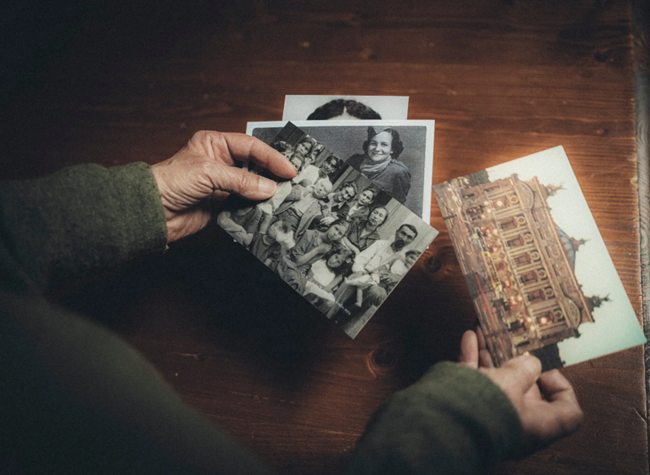Book Review From Rick’s Library: The Postcard

Anne Berest's "The Postcard" isn't just a novel; it's an emotional rollercoaster that will make you laugh and at moments where your emotions will be tested. supporting links 1. Anne Berest [Advance Reading Copy blog] 2. Anne Berest’s Best Story Came From Deep in Her Family’s Past [Lit Hub] 3. Anne Berest on Diving Into Her History for The Postcard podcast [Lit Hub] 4. Introduction to the Holocaust [Holocaust Encyclope...
Anne Berest's "The Postcard" isn't just a novel; it's an emotional rollercoaster that will make you laugh and at moments where your emotions will be tested.
supporting links
1. Anne Berest [Advance Reading Copy blog]
2. Anne Berest’s Best Story Came From Deep in Her Family’s Past [Lit Hub]
3. Anne Berest on Diving Into Her History for The Postcard podcast [Lit Hub]
4. Introduction to the Holocaust [Holocaust Encyclopedia]
5. The Holocaust [Wikipedia]
Contact That's Life, I Swear
- Visit my website: https://www.thatslifeiswear.com
- Twitter at @RedPhantom
- Bluesky at @rickbarron.bsky.social
- Email us at https://www.thatslifeiswear.com/contact/
Episode Review
- Submit on Apple Podcast
- Submit on That's Life, I Swear website
Other topics?
- Do you have topics of interest you'd like to hear for future podcasts? Please email us
Interviews
- Contact me here https://www.thatslifeiswear.com/contact/, if you wish to be a guest for a interview on a topic of interest
Listen to podcast audios
- Apple https://apple.co/3MAFxhb
- Spotify https://spoti.fi/3xCzww4
- My Website: https://bit.ly/39CE9MB
Other
- Music ...
⏱️ 9 min read
Imagine receiving a postcard in the mail—no return address, no message—just four names: your ancestors, victims of Auschwitz. This is the mystery that propelled Anne Berest into a journey through time, retracing her Jewish family’s horrific path in Nazi-occupied France.
In her gripping autobiographical novel, “The Postcard,” Anne doesn’t just recount history; she reclaims it. Like a detective piecing together a dark, fragmented past, she unveils the stories of those who were lost, and in doing so, breathes life into memories that might have vanished forever.
The story will describe the haunting tale of identity, survival, and the quest for truth.
Welcome to That's Life, I Swear. This podcast is about life's happenings in this world. Happenings that conjure up such words as intriguing, frightening, life-changing, inspiring, and more. I'm Rick Barron, your host.
That said, here's the rest of this story
Ok, let’s talk about the book
In The Postcard, Anne Berest embarks on a poignant journey into her family's haunting history to explore how past traumas continue to shape the present. The story begins in January 2003, when Anne's mother, Lélia Picabia, receives an unexpected postcard. At first glance, it appears ordinary—a simple tourist postcard featuring the Opera Garnier located in Paris, France. But the message on the back is chilling: four names, Ephraim, Emma, Noémie, and Jacques, the names of Lélia's grandparents, aunt, and uncle, who were all tragically killed at Auschwitz in 1942. The sender's identity is unknown, and the mystery of the postcard leaves the family in a state of shock. Eventually, they push the unsettling incident to the back of their minds.
However, this mystery resurfaces 13 years later, when Anne's daughter experiences a disturbing act of antisemitism at school. The attack and the school's indifferent response jolt Anne, bringing back memories of the cryptic postcard. This event propels her into a quest to uncover the truth behind the postcard—who sent it, and why?
Part novel, part investigative documentary, The Postcard, translated by Tina Kover, is Anne's attempt to solve this family riddle. The narrative weaves through time, as Anne, with her mother's help, reconstructs her ancestors' lives and confronts her own complex relationship with Judaism.
The journey takes readers back to early 20th-century Russia, where the family patriarch, Nachman Rabinovitch, senses the rising tide of antisemitism and decides to move his family to Haifa in Israel, to escape the looming danger. His son, Ephraim, driven by ambition and socialist ideals, leads his family on a journey from Riga, Latvia, to Palestine, and finally to France. But by the late 1930s, being Jewish in Paris means living under constant threat, and the Rabinovitch family, despite their attempts at assimilation, are caught in the horrific events of July 1942, when they are rounded up and taken to Auschwitz.
Anne's The Postcard is more than just a historical account; it's a deeply personal exploration of memory, identity, and the long shadows cast by history. To reveal more would diminish the powerful experience of reading this compelling book in full.
So, let’s talk about the author
Book author: Anne Berest. Courtesy of Lit Hub
Anne Berest is a celebrated French author known for her deeply personal and expressive writing. Born in Paris in 1979, Anne comes from a family with a rich cultural and artistic heritage. She studied at the esteemed Sciences Po in Paris, where she polished her skills in literature and the arts.
Anne first gained academic acclaim with her debut novel, Her Father’s Daughter La Fille de son père, published in 2010. However, it was her 2021 novel, The Postcard La Carte Postale, that truly established her as a powerful voice in contemporary literature. The book, inspired by a mysterious postcard received by her family, delves into themes of identity, memory, and the lingering impacts of the Holocaust. It was a deeply personal project for Anne, as it explores her own family's history and the trauma passed down through generations.
In addition to her novels, Anne has worked as a playwright and screenwriter, contributing to the French cultural scene in various forms. Her work often reflects her fascination with identity, history, and the intersections of personal and collective memory. Anne’s writing style is marked by its emotional depth and her ability to weave together historical facts with compelling narratives.
Annet's work has garnered several accolades, and she continues to be an influential figure in French literature. Her exploration of Jewish identity and the generational trauma of the Holocaust resonates widely, making The Postcard not just a personal family story, but a universal tale of loss, remembrance, and resilience. The autobiographical novel is entirely based on real events that happened throughout Anne's life.
What drew my interest in reading this book?
For over the past few years, my wife has been working diligently pulling together her family tree. She knew nothing about her ancestors but was determined to find out. While working on her family tree, she discovered a lot of things, some surprising and others intriguing.
Going through the pages of this book at the bookstore, I came across passages that called out similarities to what my wife was doing with her investigating her family past, taking copious notes, gathering old photographs, coming across dead ends, while carefully pulling the family tree puzzle together.
The story Anne wrote in ‘The Postcard’, follows a similar path, which made the book even that more interesting to read.
What can we learn from this story? What's the take away?
Anne Berest's "The Postcard" isn't just a novel; it's an emotional rollercoaster that will make you laugh and at moments where your emotions will be tested.
At its heart, ‘The Postcard’ is a personal exploration of family, heritage, and the long shadow cast by the Holocaust. But it's so much more than that. It's a mirror that reflects our own quest for identity, forcing us to confront the age-old questions: Who are we? Where do we come from? What shapes us?
Even before embarking on the project that became “The Postcard,” Berest had always been attracted to the past. Here, her mother, Lélia Picabia, looks over family photos. Courtesy of New York Times
Anne's masterful storytelling weaves together threads of history, memory, and personal reflection into a tapestry that's both beautiful and haunting. It's the kind of book that doesn't just entertain - it transforms. It challenges you to think, to feel, to remember.
Her book is a testament to the power of storytelling to connect us across time and space.
So, to anyone seeking a profound written journey, I can't recommend "The Postcard" highly enough. Prepare to be moved, challenged, and ultimately, changed. It's more than a novel - it's a piece of yourself you didn't know you were missing.
Well, there you go my friends. That’s life, I swear.
For further information regarding the material covered in this episode, I invite you to visit my website, which you can find on Apple Podcasts, for show notes and the episode transcript.
As always, I thank you for the privilege of you listening and your interest.
Be sure to subscribe here or wherever you get your podcast so you don't miss an episode. See you soon.












